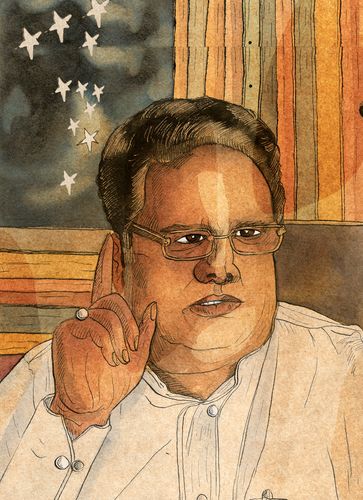WHEN I PITCHED a story on Rakesh Jhunjhunwala in mid-2015, I had my doubts on whether he would agree to a meeting. He rarely gave media interviews; there would at most be a couple a year, and that too in business magazines or pink newspapers.
Despite the odds, I had to try. I got the board line number of his company, RARE Enterprises (named by taking the first two letters of Rakesh and wife, Rekha) and spoke to a receptionist. She gave me his email address and I mailed him. There was no reply. I tried again. This went on for 25 days. Then, suddenly one afternoon in June 2015, I got a call from a Mumbai landline number. “Hi, this is Rakesh Jhunjhunwala calling. When would you like to meet me?” I said, “At the earliest.” I landed at his office at Nariman Bhavan in Mumbai with our chief photographer Amey Mansabdar. It was morning and the Big Bull was sitting at his desk, surrounded by screens that flashed stock market updates. He got up to greet us, but suddenly got an urgent call; he asked us to postpone the meeting to later in the day. I was afraid that he would change his mind and cancel it.
Fingers crossed, we reached his office in the evening. This time, he was in no rush. We were ushered past a big portrait of Lord Balaji at the entrance and into his cabin; it had an excellent view of the Arabian Sea and several idols of Lord Ganesha. He greeted us with his white shirt untucked and led us to a huge conference table. “These Ganesha idols inspire me,” he said. “All of them are gifts. I am not very religious, as you may think on seeing these idols. But, yes, I do believe that God is the giver of all wealth.”
During the two-hour conversation, I got a glimpse into how he analysed a company’s performance. “People look at profits to judge the performance of a company,” he said. “But I look at the different factors that drive those profits. For instance, Infosys capitalised on the IT opportunity and succeeded.”
Jhunjhunwala, who has been called the Indian Warren Buffet, recalled a lunch meeting with the billionaire investor in Delhi. “Though I have been compared to him, I am nowhere near him,” he said. “I have neither his skills nor his wealth. In fact, I do not have as much wealth as people think I have. But, yes, I have much more than I need.”
As a stock market expert, he believed that one should never be afraid to make mistakes; no one is perfect. However, the mistake should be such that the investor should have the ability to live to fight another day. He felt that investors must approach the market with optimism and an open mind. He also believed that stock markets were “Like women, volatile and difficult to understand and cannot be taught but have to be learnt.”
It was Jhunjhunwala's father, an income tax department employee, who had set him on the investing path. Radheshyam Jhunjhunwala had taught his son to always aspire, but never envy someone because he had got something by God’s grace. Father and son lived together in Mumbai, and would discuss stocks every day till the former died.
Jhunjhunwala's initial investment was 15,000; he later supplemented it with a borrowed capital of 120 lakh. He made 125 lakh in the first year and never looked back. One of his first investments was Tata Tea. Another early investment that paid off was Sesa Goa, the iron-ore exporting company.
Asked about his net worth and assets, Jhunjhunwala said, “Personal wealth is like a woman’s age; it cannot be discussed in public.”
An issue that bothered Jhunjhunwala was the average Indian's lack of exposure to the stock market, compared with other countries. He felt that individuals should invest some amount in equities every month.
Though stocks were his passion, Jhunjhunwala was also an avid reader. “As a child I was a voracious reader, mostly of adventure and history books,” he said. “I even read comics—Phantom, Tarzan and Mandrake. My father used to motivate me to read and recommended books.” He was equally fond of horses and loved to see them race. He used to be a regular at the Mahalaxmi Race Course in Mumbai.
At home, he was a doting father to daughter, Nishtha, and twin sons, Aryaman and Aryavir. He was also full of praise for Rekha, who was his pillar of strength. He considered charity his fourth child, and was concerned about child malnutrition and women’s education in India.
This May, seven years later, I approached him for another interview; he was in the thick of launching Akasa Air. This time he was quick to reply and recalled our earlier meeting. He called me from his personal number. “Let us do it sometime in June,” he said. When I reached out in June, he said, “I am not in good health. Forget the interview for now, we will meet after two months.”
That interview never happened.


